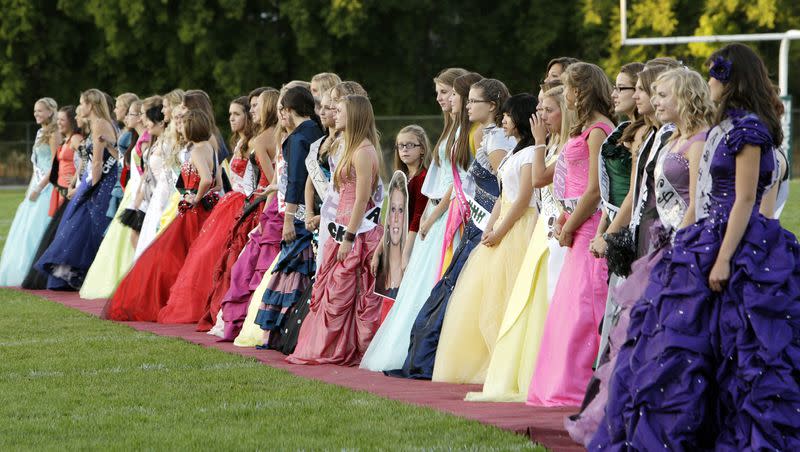Is the era of the homecoming king and queen officially over?

- Oops!Something went wrong.Please try again later.
Former ESPN broadcaster Sage Steele said over the weekend that her daughter’s school has abandoned the fall tradition of naming a homecoming king and queen, opting instead for the generic title “royalty.”
Steele called the change “comical,” and many of her followers on X said as much, with Meghan McCain responding “Dude switch schools.”
So my daughter just got home from senior homecoming. The kids weren't allowed to vote for a king & queen. They were told to vote for 3 "homecoming royalty" --
male, female & non-binary.
All 3 got crowns 👑 .. no tiaras for the female, and the sashes only said "royalty"…— Sage Steele (@sagesteele) October 22, 2023
There are, in fact, many high schools, colleges and universities that still name homecoming kings and queens. Texas Tech University, for example, crowned theirs on Oct. 14, and many other schools did so this past weekend.
Congratulations to Juliette LeRay and Brooks Belanger, LSU's 2023 Homecoming Queen and King! 👑 💜 💛 pic.twitter.com/BjHg9Eqvah
— LSU (@LSU) October 22, 2023
But the selection process is no longer a popularity contest as it was for previous generations. Many schools now invite students to apply for the homecoming court, and among other things, require the submission of GPAs and transcripts. In some cases, interviews with faculty and alumni are required.
In other words, even when the language remains the same, it’s not your grandparents’ homecoming king and queen anymore — probably not even your parents’ — and hasn’t been for a while.
The ritual has been evolving for several decades out of a desire to get beyond the stereotypical selection of the most beautiful and popular students, and to recognize different types of achievement. (The New York Times reported in 1998 on the University of Illinois selecting a homecoming court based on “scholastic and community achievements.”)
But societal pressure to move beyond identification as male or female seems to have accelerated the trend. Social media brims with “homecoming royalty” posts this fall.
Related
ESPN, sports anchor part ways after settling free-speech lawsuit
Former ESPN anchor speaks out on ‘hypocrisy’ of network rules
Refreshingly, some schools have embraced what many people see as the silliness of the tradition. Riverside-Brookfield High School in Illinois, for example, is now naming “Royal Bulldogs,” as a nod to the school’s mascot. It is yet another example of how American culture is being reshaped by the young.
While it’s unclear who invented homecoming kings and queens, homecoming itself dates to the early years of the 20th century. Hollywood stars who have homecoming king or queen on their resume include Meryl Streep and Bruce Willis.
The term “homecoming king” has become synonymous with likability — Barack Obama has been described as having “homecoming king charm” and The New Yorker sarcastically awarded Donald Trump the title when he appeared at an Iowa high school’s homecoming event in 2015.
But such descriptions will likely become rare in the future. Education Week reported earlier this year that the “king” and “queen” titles are disappearing not only from homecomings, but from proms, and it’s students who are driving the change, “regardless or in spite of the broader community’s political leanings.”
While Steele, who settled a lawsuit with ESPN over controversial remarks, found the “homecoming royalty” change at her daughter’s high school amusing, she was measured in her subsequent discussion, saying, “It’s a fine line when you’re trying to stand up to things like this, while also respecting what our kids want us to do as parents. They simply want to be kids, have fun, and in many cases, just get that diploma and get out.”
She added, “It all gets more serious in college ... and I believe in preserving this ‘innocent’ time in their lives as much as possible. I try hard to respect their wishes. MOST IMPORTANTLY, the conversations we, as parents, have with our children are SO much more important ... and ESSENTIAL to combatting what our schools/government are trying to do. It all starts at home.”

